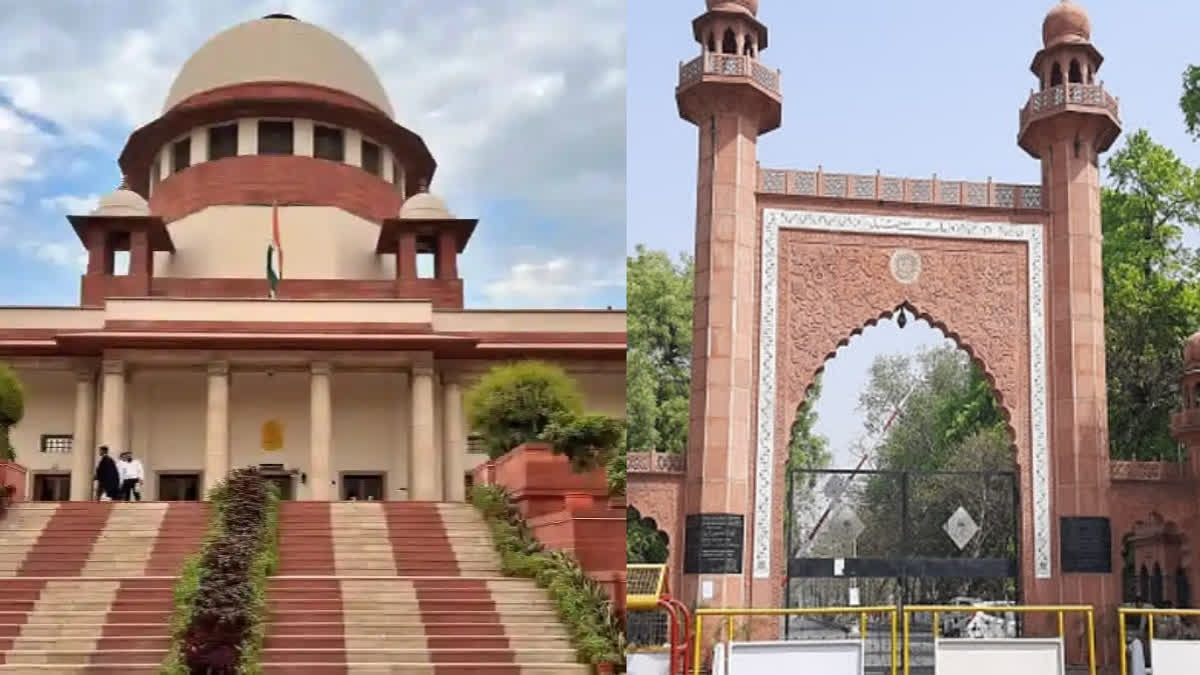New Delhi: The central government Tuesday told the Supreme Court that the Aligarh Muslim University (AMU) surrendered its minority character when it was conferred with University status under the 1920 AMU Act.
A seven-judge headed by Chief Justice of India D Y Chandrachud and comprising justices Sanjiv Khanna, Surya Kant, J B Pardiwala, Dipankar Datta, Manoj Misra and Satish Chandra Sharma, is hearing pleas in connection with the hugely disputed minority status of AMU. The Centre had submitted before the apex court that survey of the provision of the Aligarh Muslim University at the time of the inception of the university in 1920 clearly points towards a predominantly national and non-minority character of the university, and, in fact, the minority element was only present as an exception or a carve out as opposed to the omnipresent non-minority character.
The bench, in the day long hearing, queried Solicitor General Tushar Mehta, representing the Centre, does the Aligarh Muslim University Act, 1920, have the consequence of abrogating its status as a denominational institution governed by a religious minority? Mehta said there were institutions during the British rule, which had reputation and granted degrees except they were not under the British crown (gives list of examples - Scottish College, Roorkee College etc), and added that several institutions choose not to align with the British. Mehta said a minority institution can be open to everyone and that it wouldn't rob it of its minority character if its other attributes are satisfied. He stressed that when an institution agrees to the terms and conditions of the government and chooses to be dissolved, its earlier status is relinquished.
The CJI asked Mehta, “what are the indicia to indicate that when AMU was conferred with the university status that it surrenders its minority status. That mere fact that it is given a university (status) does not amount to the surrender of minority status. We have to independently see whether by the Aligarh Muslim University Act, 1920….. a denominational character of AMU was lost”.
Mehta cited correspondence between the British government and AMU regarding its minority status, the debates in the imperial Parliament where a bill was introduced and it was on surrendering denominational character. Citing the apex court judgment in Azeez Basha case, Mehta said it says that you have surrendered and the Act came into effect, now you cannot claim minority status, and “I will show that finding, Basha was very cursorily read (by the petitioners' counsel)”.
Senior advocate Rajeev Dhavan, representing the AMU, vehemently submitted that they surrendered only in respect of property and nothing else. “Word surrender is only used in respect of property (not minority status), nothing else”, said Dhavan. Senior advocate Rakesh Dwivedi, citing the book The Loyal Musalman authored by Sir Syed Ahmad Khan, said he started this from primary school to AMU and the whole purpose of AMU was to create a body of educated Muslims, who are loyal subjects.
The CJI said a minority institution may set up a purely secular form of educational institution, a minority can set up an architecture college, it can set up a medical college. Mehta said he has no quarrel with this observation.
“Sir Syed's idea was to set up an entirely secular institute…”, CJI said. Mehta said we are testing something that happened in 1920, based on Article 30 of the Constitution, which was not there at that point in time. Article 30 of the Constitution provides that all minorities, whether based on religion or language, shall have the right to establish and administer educational institutions of their choice.
“The facts that transpired in 1920 and before that would have bearing whether they are entitled to protection under Article 30…..in 1920, they did not have the benefit of minority status because there was no Constitution….”, said the CJI.
